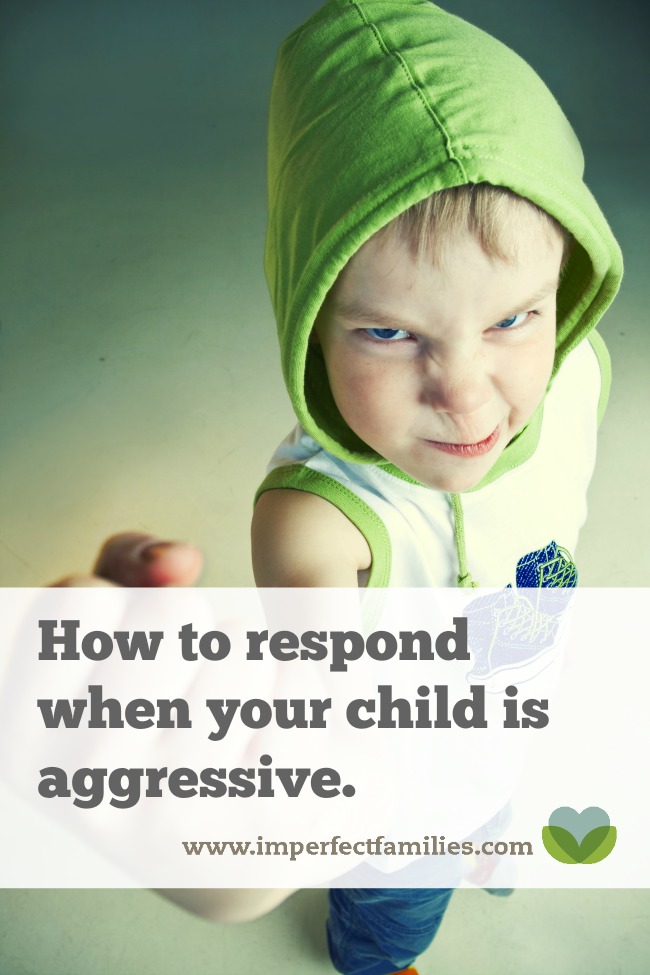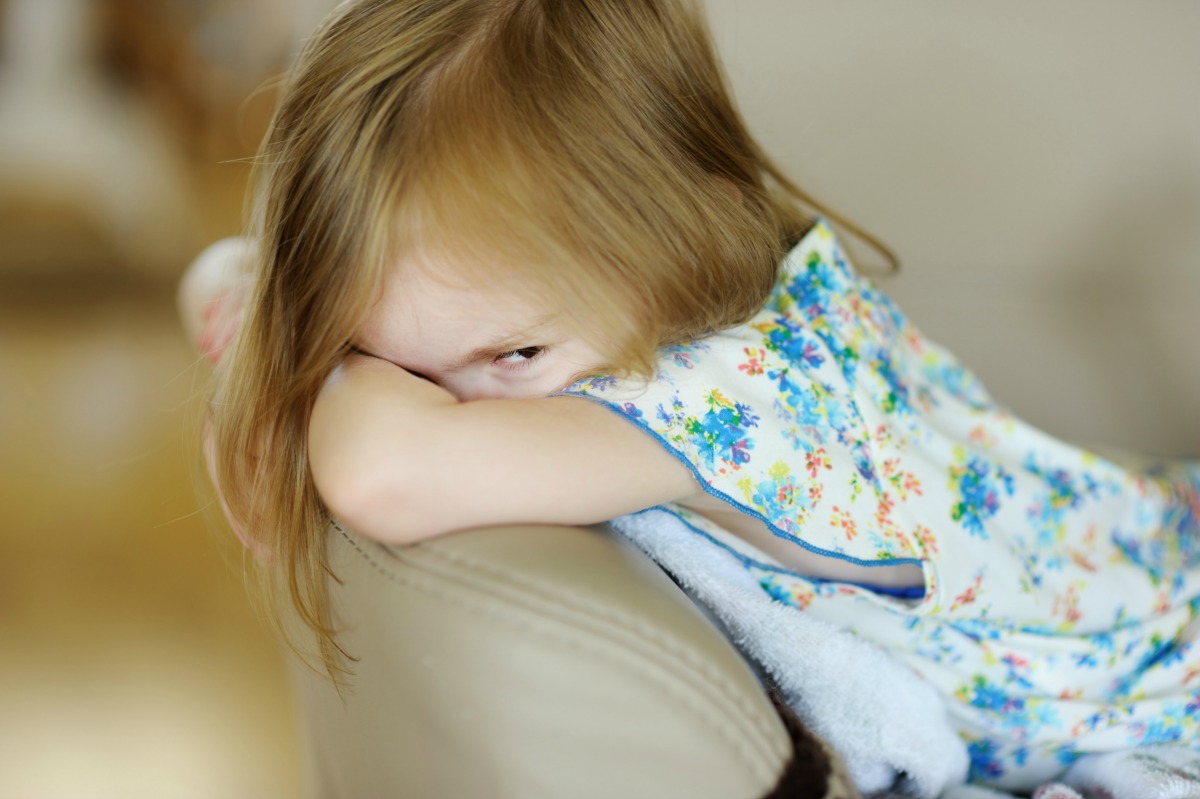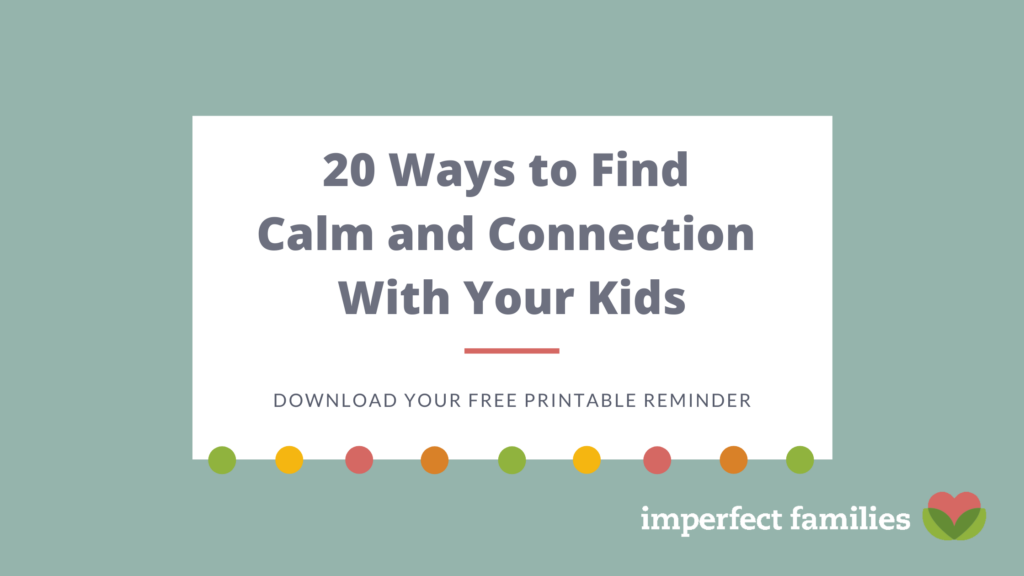Learn how shame impacts the behavior of aggressive kids. These positive parenting tips will help you get to the root of the problem and begin to free your child from negative self-talk, anger, and acting out.

The meticulously created Lego creation smashes against the wall and shatters into a hundred pieces.
“That’s enough!” You yell, hoping to diffuse the situation.
He screams back, picking up another handful of Legos.
“What has gotten into you? We don’t throw toys in this house!”
Your response only seems to fuel the fire.
Trying a different tactic, you switch to empathy, “You seem angry.”
“I’m not angry!” He screams back.
What?!
If he’s not angry, you don’t know what other emotion would fit.
You’re tired of this behavior. Over the past few months, these angry fits have been increasing. No amount of timeouts, punishment, or consequences seem to make a difference.
Maybe it’s time for a radically different approach.
Aggressive Kids: The “I’m a bad kid” cycle.
If you’re ready to address this behavior from a new perspective, you’re going to have to look beyond the flying Legos.
Let’s imagine, just for a moment, that your child wants to do well. He wants to make good choices. He wants to be connected to you.
But sometimes, he enters the “I’m a bad kid cycle.”
Here’s how it works:
Your child feels a big emotion – maybe anger, frustration, anxiety, or disappointment.
He has no idea how to handle this big feeling, so he just reacts – throwing things, slamming doors, hitting his sibling.
Immediately after he engages in these behaviors, he feels horrible. Terrible. Maybe even shocked. The first thought that crosses his mind is, “I’m a bad kid.”
Since you’re nearby, you respond to the behavior: yelling, giving a consequence, repeating the house rules.
Your response confirms his thought, “See, mom thinks I’m a bad kid too.”
The more often he tells himself this thought, the more he believes it. And, the more he believes it, the more often his behavior reflects it.
Fueled by shame.
Shame is the powerful force that keeps this cycle spinning.
Beyond “I’m a bad kid,” shame quietly whispers, “You’re not worthy of love.”
Suddenly aggressive kids are on the defense. They try to ignore the horrible feelings and minimize their actions so they appear lovable, contradicting the obvious by saying, “I didn’t hit my sister” or “I’m not angry.”
Some kids push you away, verbally or physically, “Get away from me! Can’t you see I messed up? I’m a bad kid. I don’t deserve love.”
These kids are stuck. They need your help.
Related: How to Respond When Your Child is Disrespectful

Interrupting the cycle.
Most of the time, parents have no idea how much shame their child is experiencing.
Your child’s behavior seems to be a personal attack against you. It seems that your child is intentionally acting out to get their way, or that they know how to handle the situation better, but they are choosing not to.
And sometimes, you may be right.
But for a lot of aggressive kids, the behavior you see is a sign that they are stuck in the “I’m a bad kid cycle.”
What if, instead of trying to find the “perfect consequence” for your child’s behavior, you helped him escape this cycle? What if you gave him a way out?
Here are 5 Ways to Interrupt the “I’m a bad kid cycle.”
- Work on your stuff: It’s difficult to help your child break this cycle if you are stuck in your own shame. Take some time to look at your parenting triggers, find time for self-care, or create some positive mantras. Instead of criticizing your past mistakes, give yourself some grace. Find a community or support as you work to make changes.
- Quiet the alarm: When kids are aggressive or yelling, your natural response may be to match their intensity with your own (as if an alarm was going off in your head). Unfortunately, this response perpetuates the cycle. Instead, take a few breaths to calm your own emotions before you respond. Silence the alarm by reminding yourself that “this is not an emergency.”
- Look past the behavior: Many parents feel an urgency to punish or “teach a lesson” when their children act out. Smashing toys, stomping feet, and hitting siblings are signs that your child is dysregulated, or that they need new strategies to manage big feelings. Sometimes, it requires a little detective work on your part to understand what thoughts or feelings may be impacting their behavior.
- Empathize with the struggle: Put your child’s complex emotions into words, “That Lego creation wasn’t coming together as you hoped, was it? Your hands felt like throwing, and now you have to start all over. I bet you wish you didn’t throw it, huh? It’s not always easy to make good choices when we’re frustrated.” You don’t have to agree with their behavior to let them know you understand.
- Set boundaries with compassion: Creating a safe environment and setting firm limits is important, but it does not need to be done with harshness. Get below your child’s eye level, if possible. Offer a hug or comfort. Redirect hitting hands with gentleness rather than force. Use your calm confident presence to send the message, “This seems big and scary, but we can handle it. I am here with you.”
Why it works.
If you’re ready to help your child escape the “I’m a bad kid cycle” you need to be willing to connect on an emotional level before you correct the behavior.
This is not an easy step.
You may find yourself doing whatever it takes to stop the tantrum, silence the frustrated cries, and jump in and solve the problem so peace can return to your home.
But, here’s the thing — when you are willing to say, “I see you struggling AND I love you in this moment,” shame cannot survive.
Your child can escape the cycle!
Now, your child can learn to manage frustration, they can overcome anxiety and embrace imperfection because they know that they are worthy of love no matter what.
Maybe that’s not such a radically different approach after all.
Support is available!
If you’re ready to break this “bad kid” cycle for your child, but are still not sure how it works, online Parent Coaching is a great option. We can talk through your frustrations, the challenges, the disappointment, and the guilt, and find solutions that will help your aggressive child thrive and bring peace back to your home. Learn more about my money back guarantee and schedule your first Parent Coaching appointment today.



Comments have been turned off to retain the privacy of all families. If you have a question or comment on the topic, you're always welcome to contact me.